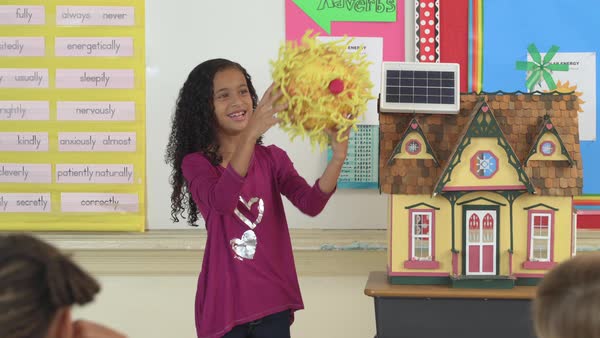Your daughter tells you that in three weeks she must do a science report out loud to her whole class. As she explains this assignment, she looks funny, like the look she always has right before throwing up.
What advice do you give right then? “You’ll be fine. You’ll work on your report, you’ll get all the information together, then we’ll help you practice it so it comes off great in class.” As the color returns to her face, she runs off to put the report together.
In a week or so, she is ready to have you look at a first draft. You make some suggestions for what to leave in, what to take out, order, timing, the look of the prop that goes along with the report, and its length.
In the final days before the class report, she does some run-throughs and you give suggestions, including slowing down her speaking, speaking up so everyone can hear, and looking around the class at others while she talks. None of this really comes naturally. It takes some extra practice, but on the big day, the report is delivered with style and flair. There is an “A” and a smiley face on the teacher’s comment sheet. High fives, a trip out for ice cream, and a call to Grandma end the day.
If you had your child go through all that preparation for a 15-minute report, shouldn’t you at least go through that for every one of your trials?
Yes. Yes, you should, and here is why:
A federal judge from Illinois, The Honorable Amy J. St. Eve, recently published a 6-year study in the Cornell Law Review summarizing what over 500 jurors told her on a post-trial survey concerning their likes and dislikes about the attorneys they had seen in trial. Not coincidentally, all the comments were simple and predictable because they are the same comments you would have made to your 9-year old. Here is a quick summary of the juror feedback in order of importance:
- Organization, preparation, and efficiency. Jurors liked brevity, conciseness, preparation. They could “tell” when attorneys were prepared and when they were not. They did not like having their time wasted with “fluff.”
- Delivery and presentation. This category included speaking slowly and loudly enough to be heard, making appropriate eye contact, and speaking to the jury as if it were a face-to-face conversation with another person. They liked being spoken to, not at.
- Attorney behavior and professionalism. They liked respect for and cooperation with opposing counsel, respect for every witness, and respect for the jury [like being on time]. They wanted attorneys to act as if this whole event was about the case, not about them. Eye-rolling, laughing at others, and showing disgust were all mentioned as disrespectful behaviors that jurors see because they watch everything at all times.
- Evidence presentation, including
- Minimizing repetition
- Asking clear questions
- Using visual aids seamlessly [having a rehearsed look, not fumbling with laptops or slides or boards]
- Incorporating timelines of events to keep them oriented.
You should have recorded yourself saying all these things to your daughter before her class presentation, shouldn’t you have? Then you’d have that recording to play for yourself before all your trials.
Remember, these simple, almost obvious, pearls of wisdom not only came from 500 jurors, they came right from inside you as you prepped your child.
Here is the link in case you want to read all of Judge St. Eve’s article: http://cornelllawreview.org/files/2018/04/St.EveEssay-1.pdf
Share This Story, Choose Your Platform!
Click below to add your email address to our mailing list and receive the latest Persuasion Tips right in your inbox!

